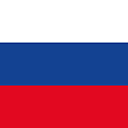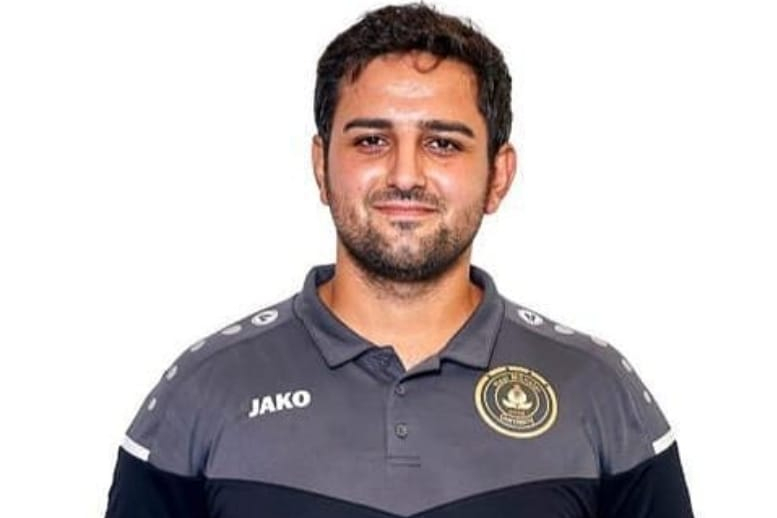Президент и основатель клуба "Реал Мюнстер" Габриэль Мохагеги — один из тех, кто активно вкладывается в развитие мирового пляжного футбола. Помимо немецкого клуба, он тренирует сборную Люксембурга, открывает академии в Сенегале и Иране, также помогает разным клубам организовывать тренировочные сборы.
BSRussia пообщалась с Габриэлем, чтобы лучше узнать его мотивацию и планы на будущее.
— Габриэль, как вы попали в пляжный футбол? Чем вас так очаровал этот вид спорта, раз вы решили все личное время посвятить его развитию?
— Я играл на высоком уровне среди юниоров, но затем в 2013-2014 годах вынужден был закончить карьеру из-за проблем с коленями. Тогда я решил, что нужно развиваться дальше в качестве тренера и предпринимателя. Поэтому по окончанию института решил заниматься данными областями деятельности.
Пляжный футбол мне знаком ещё с тех пор, как я жил в Иране до 14 лет, поскольку на моей родине этот вид спорта очень популярен, и есть множество возможностей им заниматься.
— Как вам пришла идея организовать собственный клуб и достаточно быстро добиться участия в международных соревнованиях, таких как Euro Winners Cup?
— В один из дней я решил составить себе задачи на пять лет и каждый день делал всё, чтобы добиться поставленных целей. В прошлом году этот план закончился. Тогда я поставил себе новую задачу — за следующие три года попасть в мировой топ-3 клубов. Мне помогает, что я сам — спортсмен, поэтому понимаю изнутри что нужно сделать, как организовать работу команды. В подобных деталях бывшие спортсмены лучше разбираются.
Нам очень повезло, что мы в "Реал Мюнстер" можем приглашать игроков со всего света, в том числе из России. Если у тебя в команде хорошие футболисты, то ты будешь широкими шагами идти в направлении больших побед. Конечно, мы много инвестировали в наш клуб. Если ты инвестируешь серьёзные средства, то, естественно, хочешь добиваться серьёзных успехов.
Каждый год мы принимаем участие в международных турнирах. В последние годы нам удалось поиграть против сильных команд, в том числе против московского "Спартака", что помогает нам в развитии. В ближайших целях у нас — победа в чемпионате Германии в следующем сезоне, а на Euro Winners Cup хотим как минимум сохранить позицию в топ-3, которую мы достигли в 2020 году.
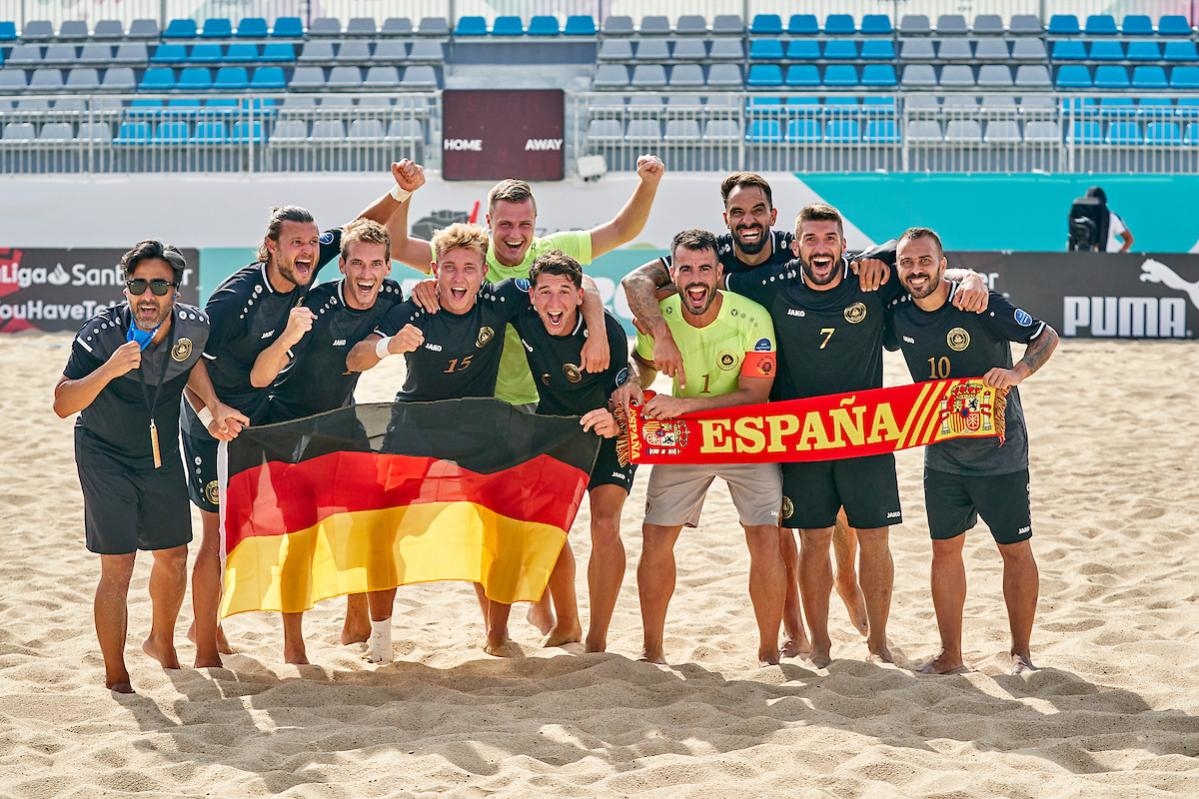
— Одна из особенностей пляжного футбола — теоретическая способность любого клуба на короткой дистанции какого-либо турнира "выстрелить", пригласив лучших футболистов. Какую модель развития вы предпочитаете выстраивать в клубе? Делаете ли ставку на приглашённых звёзд или стараетесь выращивать своих на долгосрочную перспективу?
— Моя модель проста. Я ни с кем не работаю краткосрочно. Если начинаю сотрудничать с человеком, то это рассчитано на долгое время. Если кто-то из футболистов травмировался, заболел, просто не может играть по каким-либо причинам, то тогда мы, конечно, приглашаем кого-то со стороны.
Но костяк команды стараемся держать постоянным. Например, с нами уже долгое время работает голкипер сборной Испании Хосе Карлос Карильо. Так же из испанских футболистов мы сотрудничаем с Пабло Пересом. Сотрудничество рассчитано на длительный срок.
Я стараюсь делать так, чтобы мои ребята во время турниров не думали о бытовых мелочах, чтобы ничего не отвлекало их от футбола. Организовываю проживание в лучших доступных отелях, обеспечиваю лучшую экипировку, питание. Поэтому футболисты "Реал Мюнстер" могут сконцентрироваться только на игре. Я стараюсь со своей стороны все делать профессионально, чтобы ребята могли спокойно добиваться поставленных целей.
— Вы также занимаете пост главного тренера сборной Люксембурга. В классическом футболе эту страну традиционно относят к "футбольным карликам". Возглавив национальную команду, вы сказали, что в Люксембурге много талантливых футболистов, и из молодых игроков можно создать команду хорошего уровня. После полугода работы ваше мнение не поменялось?
— С "Реал Мюнстер" я получил хороший опыт, поскольку удалось "с нуля" выстроить конкурентоспособную команду. Германия — большая страна с большим количеством футболистов. Между тем, немногие в Германии играют в пляжный футбол, поскольку сезон короткий, недостаточно инфраструктуры, да и вообще предпочитают классический футбол. В Люксембурге в этом плане работать легче. Страна небольшая, если что-то происходит, то ты сразу об этом узнаёшь.
В Люксембурге, на самом деле, много футболистов, но у них нет опыта игры именно на песке. Но, как тренер, я очень терпелив. Даю время ребятам, чтобы адаптироваться в пляжном футболе. Конечно, нам пока сложно конкурировать с лучшими мировыми сборными, но при правильном подходе потенциал для развития есть. Нужно просто дать время.
Я очень рад, что Beach Soccer Worldwide (BSWW) ("Всемирная Организация Пляжного Футбола" — Прим. BSRussia) поддерживает меня на посту тренера сборной Люксембурга. Мы договорились, что я представлю план развития команды, а BSWW окажет мне необходимое содействие. Они дали понять, что будут только рады, если в мире появится ещё одна сборная хорошего уровня. Главная сложность — привлечение молодёжи в пляжный футбол, помощь им овладении основам этого вида спорта. В этом мне помогает национальная федерация. У меня было много предложений до того, как я стал тренером сборной Люксембурга, но я выбрал эту маленькую страну, потому что она очень удобно расположена. Я могу добраться на машине из Германии за четыре часа. Также тут есть возможность проводить сборы, существует вся необходимая инфраструктура. Так что я вижу потенциал для развития.
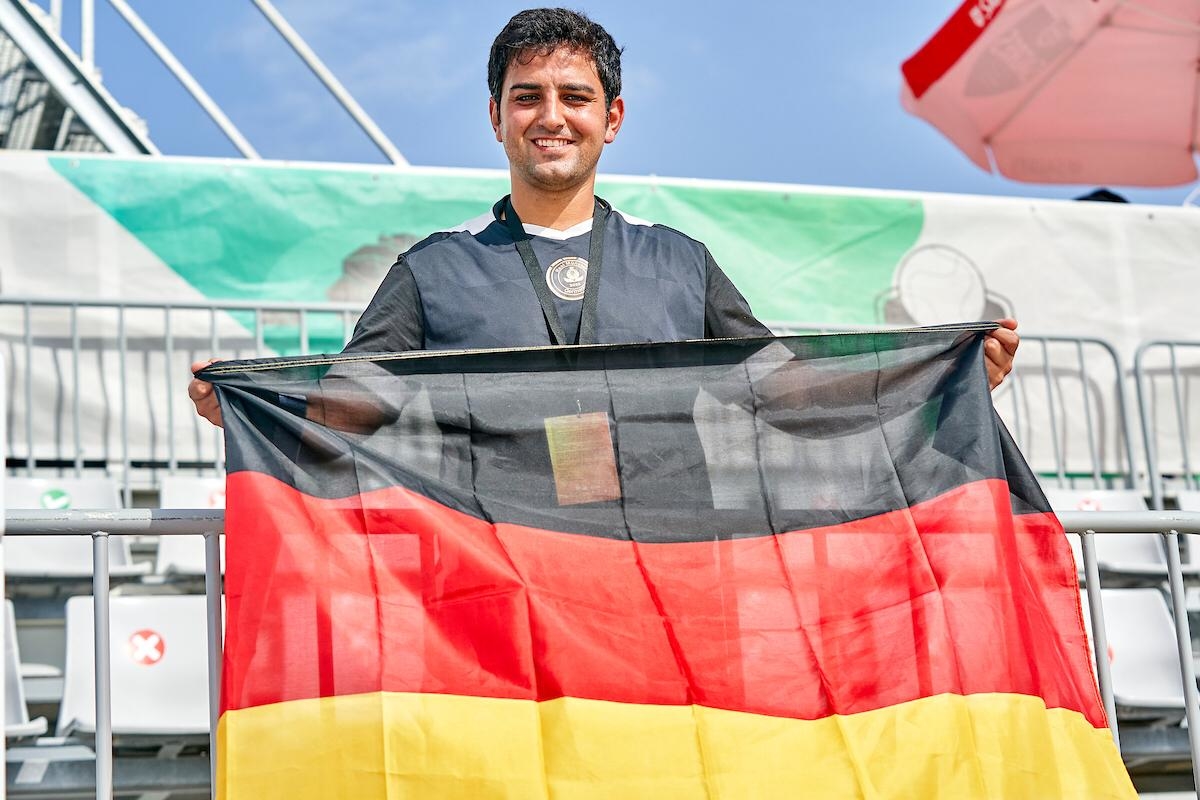
— Сезон 2020 года получился сложным по понятным причинам. С другой стороны, для вашего клуба он был ознаменован историческим успехом. До "Реал Мюнстер" ни одна немецкая команда не занимала такое высокое место на главном европейском клубном турнире. Как вы оцениваете прошедший год с учётом всего, что происходило с мировым спортом?
— Мы отлично стартовали в 2020 году. Первый же турнир, в котором мы приняли участие, наряду с действующим чемпионом Германии, выиграли. На Euro Winners Cup у нас не смогли поехать несколько ребят, но из-за этого мы получили хорошее усиление в виде футболистов других клубов. Многие из них, такие как Антон Книллер, Георгий Ловчев, будут работать с нами и в грядущем сезоне.
Конечно, когда ты играешь на главном европейском турнире против украинского "Выбора", то не думаешь, что можешь победить 13:1. Но когда это произошло, то я понял — моя команда может многое. Вместе с тем, есть и потенциал для роста. В ближайшее время мы планируем стать чемпионами Германии, причем удерживать этот титул как можно дольше. Очень важно, чтобы команда могла сохранять достигнутые позиции. Мне кажется, сейчас мы уже готовы к чемпионству. В предыдущих "Финалах четырёх" наше выступление, на мой взгляд, было неудовлетворительным.
В наступающем сезоне мы постараемся принять участие в как можно большем количестве международных турниров. На мой взгляд, мы — самая играющая команда в мире (улыбается). То, чего мы достигли в прошлом году — невероятно, мы будем стараться забраться ещё выше.
— В конце 2020 года всех неприятно удивило решение Немецкого футбольного союза (DFB) о приостановке деятельности национальной сборной Германии. Как это может сказаться на популярности и развитии пляжного футбола в стране?
— DFB просто не хотел принимать на себя финансовые обязательства по содержанию национальной команды. Недавно было принято решение, что клубы немецкой лиги возьмут их на себя. Каким образом это будет реализовано — пока неизвестно, но на прошлой неделе у нас была встреча, на которой DFB поддержал это решение. Так что сборная Германии продолжит играть, но финансирование команды будет идти из других источников.
— Недавно появилась информация, что вы создаёте академию пляжного футбола в Сенегале. Почему именно эта страна и на что будет нацелена работа академии?
— Я всегда думал, если я кому-то могу помочь, то я помогу. Неважно в какой части земного шара. В 2016 году я посетил Сенегал, и мне очень запомнилось, как там люди с утра до вечера играют в пляжный футбол и как там любят этот вид спорта. Но у местных футболистов отсутствует нужная техника и тактические навыки. Сборная Сенегала в Африке очень сильна и практически не имеет конкурентов, но для выхода на мировой уровень многого не хватает.
Молодые ребята не имеют возможности тренироваться в нужной экипировке, с нужными мячами. Я увидел это и решил помочь. Обратился к друзьям, спонсорам, чтобы помочь детям заниматься любимым делом в комфортных условиях. У сенегальских футболистов большой потенциал, но нет фундамента. Они не могут реализовать все возможности, поскольку, в отличие от тех же бразильцев и португальцев, они не выступают по всему миру. Я посчитал, что если я смогу дать им основы, то в дальнейшем сенегальцы смогут выйти на хороший уровень, играть в европейских клубах, достойно зарабатывать.
Также президенты Мавритании, Мали, Конго были очень рады, что кто-то помогает африканским футболистам "открыть дверь" в мир большого пляжного футбола, и они так же поддержали наше начинание. Я рад, что у меня появилась финансовая возможность открыть это учебное заведение.
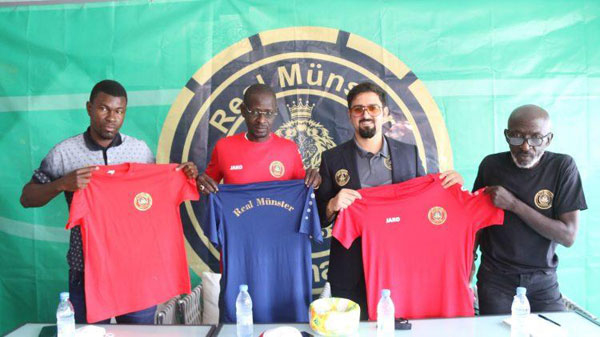
— Сколько времени, по вашему мнению, должно пройти, чтобы начинающий игрок, впервые вышедший на песок, смог достичь конкурентоспособного уровня?
— Это, конечно, зависит от таланта. Можно и через полгода достигнуть приличного уровня, а дальше через игровую практику улучшать свои навыки. Но у меня были футболисты, которые и за несколько лет не смогли адаптироваться на песке.
Пляжный футбол — достаточно простой вид спорта, если сравнивать с классическим футболом. Из-за количества игроков на площадке, вариантов взаимодействия между собой гораздо меньше. Научиться этим схемам проще. Но, как тренер, я должен иметь терпение, чтобы донести всё до футболистов. Мне также необходимо, чтобы каждый игрок мог работать на разных позициях, поскольку универсализм в нашем виде спорта очень важен. Площадка маленькая. Поэтому нужно, чтобы футболист приносил пользу на каждом участке.
Также для роста необходима конкуренция. Поэтому я первым в Германии пригласил футболистов топ-уровня в свой клуб, чтобы остальные не просто увидели воочию как нужно играть в пляжный футбол, но и сами прогрессировали.
— Что еще вы бы выделили в качестве важных аспектов тренерской работы, которые помогают вам?
— Я сотрудничаю с местным институтом в Мюнстере, изучаю множество информации про пляжный футбол. Пытаюсь даже сам что-то писать. Недавно я открыл академию в Иране, работа которой начнётся в 2022 году. Возможно, это будет самая большая академия пляжных видов спорта в мире. Мне очень повезло, что вокруг меня хорошие люди, которые меня слушают, помогают. Один бы я не справился.
— Вы играли на позиции голкипера, который в современном пляжном футболе стал ключевой фигурой на площадке. Насколько это помогает вам в тренерской работе сейчас?
— На самом деле, я играл на всех позициях, знаю изнутри обязанности каждого амплуа. Но вратарский опыт действительно мне очень помогает. Понимаю, насколько сейчас важна игра голкипера ногами, и как это влияет на тактику. Поэтому я стараюсь в своих командах иметь вратаря, который умеет контролировать мяч, чтобы иметь численное преимущество при атакующих действиях.
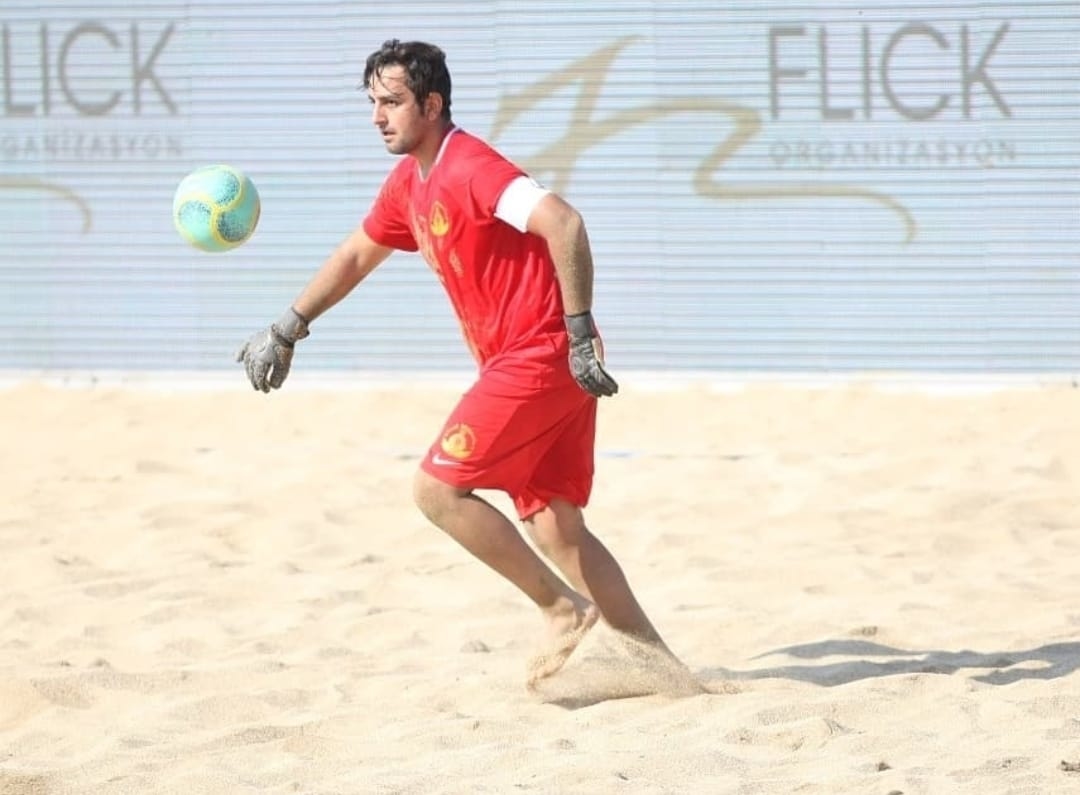
— В 2021 году в Москве пройдёт чемпионат мира. Как будете следить за этим турниром? Какие ожидания от него? Собираетесь ли посетить лично столицу России?
— Несомненно, я буду в Москве. Такое пропускать нельзя. Фаворитом чемпионата мира для меня с большим отрывом является сборная России, поскольку в вашей стране есть все возможности для победы на домашнем мундиале. Понятно, что в одном отдельно взятом турнире может произойти что угодно. Традиционно сильны португальцы и бразильцы, но я всё же считаю большим фаворитом российскую сборную.
— Насколько важным для всего пляжного футбола будет присутствие болельщиков на трибунах во время мирового первенства?
— При игре со зрителями поддержка болельщиков оказывает огромное влияние на футболистов. Она может как мотивировать, так и демотивировать. Без заполненных трибун само качество игры становится совершенно другим, оно идёт вниз. Так что и для футболистов, и для популяризации пляжного футбола очень важно, чтобы чемпионат мира прошёл в привычной для нашего вида спорта праздничной атмосфере.
— И наш традиционный вопрос, но поскольку вы сейчас ещё и тренер, то немного модифицируем его. Назовите идеальные для вас сочетания футболистов как для наставника команды, так и для игрока?
— Как тренер, я возьму в ворота нашего голкипера Хосе Карлоса. Я уверен, в ближайшие годы он будет твёрдо в топ-5 лучших вратарей мира. В защите будут Озу Морейра и Фелипе из "Браги". В нападении — Пабло Перес и Борис Никоноров. Я общался с Борисом, хотел пригласить его в "Реал Мюнстер", но, увы, он не смог к нам присоединиться из-за контрактных обязательств перед "Локомотивом".
А если говорить о партнёрах, с которыми я бы сам вышел на песок, то это будут Мохаммад Ахмадзаде, Джордан и братья Мартинсы. В такой пятёрке мяч будет постоянно у нас, и соперник просто не сможет меня даже потревожить (смеётся).

